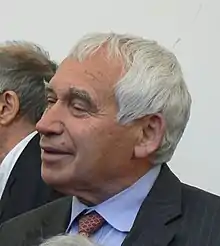Chairman of the State Council of the People's Republic of Bulgaria
The Chairman (President) of the Republic of the State Council of the People's Republic of Bulgaria (Bulgarian: Председателят (Президентът) на Републиката)[1] was the head of state of Bulgaria from 3 April 1990 to 22 January 1992. The office was known as the Chairman (President) of the People's Republic of Bulgaria until the word "People's" was dropped from the country's name on 15 November 1990. From that point on, the office was simply the Chairman (President) of the Republic of Bulgaria.
Origin
In 1971 a new constitution was approved by a referendum and came into force on 18 May 18, 1971. In the constitution a new state organ was formed: the State Council. This new organ effectively eclipsed the role of the National Assembly as it had both legislative and executive power. The State Council could issue decrees with full legal authority when the National Assembly was not in session, with no provision for later approval by the full legislative body.[2] The chairman of the State Council served as de facto head of state.
Following a wave of democratization in Eastern Europe in 1989, dictator Todor Zhivkov was forced to resign on 10 November, succeeded by Petar Mladenov. The following month the Communist Party announced it was giving up power and began a series of round table talks with the opposition on the transition to democracy. It was decided that the State Council would have to be abolished and the office of the Chairman (President) of the Republic would have to be inaugurated.
Powers and duties
The powers and duties of the office were outlined in Chapter 5 of the 1971 constitution,[3] as amended in 1990.
Office Holders
| Head of State | Term of office | Duration | Political party | ||||
|---|---|---|---|---|---|---|---|
| Nº | Portrait | Name (Born–Died) |
Election | Took office | Left office | ||
| Chairman of the State Council | |||||||
| 1 |  |
Todor Zhivkov Тодор Живков (1911–1998) |
— | 7 July 1971 | 17 November 1989 | 18 years, 133 days | Bulgarian Communist Party |
| 2 |  |
Petar Mladenov Петър Младенов (1936–2000) |
— | 17 November 1989 | 3 April 1990 | 137 days | Bulgarian Communist Party |
| Chairman (President) of the Republic | |||||||
| 1 |  |
Petar Mladenov Петър Младенов (1936–2000) |
(Apr) 1990 | 3 April 1990 | 6 July 1990 | 94 days | Bulgarian Socialist Party |
| — |  |
Stanko Todorov Станко Тодоров (1920–1996) |
— | 6 July 1990 | 17 July 1990 | 11 days | Bulgarian Socialist Party |
| — |  |
Nikolai Todorov Николай Тодоров (1921–2003) |
— | 17 July 1990 | 1 August 1990 | 15 days | Independent |
| 2 |  |
Zhelyu Zhelev Желю Желев (1935–2015) |
(Jul-Aug) 1990 | 1 August 1990 | 15 November 1990 | 106 days | Union of Democratic Forces |
On 3 April 1990 Petar Mladenov, having previously served as the Chairman of the State Council, was elected as the first President of Bulgaria, serving until his resignation in July. His resignation came after a video surfaced suggesting the use of tanks against anti-government demonstration in December 1989.
Stanko Todorov was selected to serve as acting President until a successor could be chosen. He too, had to be replaced by another acting president, Nikolai Todorov, following his resignation due to health reasons. Finally, on 1 August a compromise was reached and Zhelyu Zhelev, until then leader of the opposition party, the Union of Democratic Forces, was elected President.[4] Zhelev was in office until he was sworn in on 22 January 1992 as President of Bulgaria, under the new constitution, following his direct election by the public three days before.
References
- "Конституция на Народна република България, 1971". National Assembly of Bulgaria. Retrieved 2 January 2017.
- "Bulgaria-The State Council and the Presidency". Bulgaria. Mongabay. Retrieved 1 March 2014.
- "Конституция на Народна република България, 1971". Народното събрание на Република България. Народното събрание на Република България. Retrieved 1 March 2014.
- "Governance After Zhivkov". Bulgarian Free Books - Bringing the Reformation to Bulgaria!. Lehman Websites. Archived from the original on 2014-03-04. Retrieved 1 March 2014.